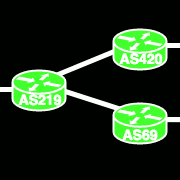|
compilers was a neat class I guess maybe I'll take another one
|
|
|
|

|
| # ? May 14, 2024 14:05 |
|
i love being close to the metal
|
|
|
|
Shinku ABOOKEN posted:what are phi nodes? why are they bad? it's the dominant way of handling data flow when control flow merges in ssa here's a dumb c program C code:code:phi nodes are the dominant answer. a phi node is a sort of pseudo-instruction you can put at the start of a block when it has multiple predecessors like this, and it basically says what the value is when coming from all the predecessors: code:the way better alternative is to say that basic blocks can have parameters and gotos can have arguments, which ends up looking kindof like a functional program with a lot of explicit tail calls: code:rjmccall fucked around with this message at 04:21 on Jun 28, 2017 |
|
|
|
good thread op why can't c/c++ compilers emit warnings when they encounter undefined behaviour? is it just that it's too hard to fit into current compiler architecture? would it be a useless thing to include because every program would be filled with undefined behavior?
|
|
|
|
rjmccall posted:... good and clear explanation 👍 thanks
|
|
|
|
redleader posted:good thread op They can in many cases. But there are some categories of undefined behavior where the compiler just doesn't know if a particular construction is going to be undefined behavior in practice, and it's not reasonable to emit a warning in cases that may or may not be undefined behavior. For example, it would not be useful if the compiler threw a "potentially undefined behavior" warning any time you did arithmetic on a signed value.
|
|
|
|
rjmccall posted:it's the dominant way of handling data flow when control flow merges in ssa CPS >> SSA
|
|
|
|
Jabor posted:For example, it would not be useful if the compiler threw a "potentially undefined behavior" warning any time you did arithmetic on a signed value. oh yeah, that's right related (but possibly a little off topic) question: what's up with the c/c++ standards committees that makes them prefer undefined over implementation-defined behavior? i mean surely most compilers would know their target's behavior with (un)signed overflow (for example)
|
|
|
|
Malcolm XML posted:CPS >> SSA they're coming to take away your child processes
|
|
|
|
redleader posted:oh yeah, that's right undefined is implementation-defined
|
|
|
|
how long before the embedded world gets first class cortex m-4 and subsequent support for building from llvm. also how long until i can stop having to loving compile cross compilers. these questions are probably linked
|
|
|
|
Writing compilers is fun I wrote a compiler and it taught me stuff
|
|
|
|
compilers are black magic to me op
|
|
|
|
Captain Foo posted:compilers are black magic to me op write one to disabuse yourself of that notion
|
|
|
|
Phobeste posted:how long before the embedded world gets first class cortex m-4 and subsequent support for building from llvm. also how long until i can stop having to loving compile cross compilers. these questions are probably linked there is a demo for Rust on Cortex M-4 so I'm going to assume llvm already supports it https://github.com/antoinealb/rust-demo-cortex-m4
|
|
|
|
Cocoa Crispies posted:write one to disabuse yourself of that notion absolutely not i don't even program
|
|
|
|
Phobeste posted:how long before the embedded world gets first class cortex m-4 and subsequent support for building from llvm. also how long until i can stop having to loving compile cross compilers. these questions are probably linked if by first class you mean broken every other day then m4 is fully supported. what's the alternative to compiling cross compilers? you just want to download a binary that builds for EVERYTHING?
|
|
|
|
in theory clang is a natural cross compiler and can in fact just generate code for anything. you do have to tell the build system to link in an appropriate backend, though, which is reasonable because backends get pretty big. but it's not like gcc where you need a different binary for every target
|
|
|
|
rjmccall posted:having a jit enables some really neat dynamic code generation and specialization tricks. i'd love to see more language implementations based on a sane language + execution environment that really take intelligent advantage of both static and dynamic information how good is modern jitted code compared to what's emitted by a traditional toolchain these days anyway? i've heard about the ability to use info you don't have at compile time to potentially produce better code before, but i have no idea how much of a difference it makes in practice. or any idea what traditional optimizations aren't possible when you're jitting, if any
|
|
|
|
redleader posted:related (but possibly a little off topic) question: what's up with the c/c++ standards committees that makes them prefer undefined over implementation-defined behavior? i mean surely most compilers would know their target's behavior with (un)signed overflow (for example) implementation-defined behavior still has to be semantically well-defined: that is, the implementation has to define exactly what happens. the vast majority of undefined behavior is not this kind of "policy" stuff where that's possible for example, dereferencing a bad pointer is undefined behavior because there's no reasonable way for the implementation to dynamically determine pointer validity; it would need to track pointers and scopes and allocations and issue a ton of checks and it would all be obscenely expensive and constraining. in theory you could define the results of dereferencing a null pointer to always be a guaranteed trap, but that would force null checks on every access on targets that can't guarantee an unmapped address (which is almost all of them, because many oses do allow you to mmap the zero page) in the policy places, it usually comes down to optimizability. these rules are designed so that the compiler doesn't have to pessimize behavior just to handle some corner case that, in the committee's judgement, shouldn't be happening in a sensible program. for example, the type aliasing rules are there so that the compiler isn't blocked from doing straightforward memory optimizations out of paranoia that you might have cast the same pointer to different types. the signed-int overflow rules are there so that the compiler can ignore the overflow-related corner cases when looking at an idiomatic for-loop. and so on
|
|
|
|
Malcolm XML posted:CPS >> SSA you should read the spj paper linked from the tweet in the op
|
|
|
|
Deep Dish Fuckfest posted:how good is modern jitted code compared to what's emitted by a traditional toolchain these days anyway? i've heard about the ability to use info you don't have at compile time to potentially produce better code before, but i have no idea how much of a difference it makes in practice. or any idea what traditional optimizations aren't possible when you're jitting, if any there are a ton of trade-offs around jits, it's really super dependent on the language and the runtime environment if the language does a lot of dispatch based on the dynamic types of values, like virtual method calls or the overloaded behavior of + in javascript, then jits have the massive natural advantage of being able to dynamically specialize the code for the types that are actually seen. like if the code is "for (i in array) { result += array[i] }" and dynamic sampling suggests that the values in the array are always integers then the jit might generate machine code for this loop where result is actually an integer variable and the loop body does a type check and an overflow check and just bails out to an interpreter if something weird ever happens even more static languages can end up with a lot of dynamic-seeming behavior because of the build model. like how java class files are meant to each be a kind of miniature dynamic library with its own stable abi w.r.t other classes (other than static final ints), so the jit is actually the first thing that's allowed to do cross-class optimization. or like how the language lets you always link in more code in java / c++, and that code might subclass some class or implement some interface, so you can't statically do an exhaustive class hierarchy analysis (e.g. to devirtualize calls to some method that in practice is never overridden); but a jit can optimistically devirtualize based on the code it sees as long as it has the ability to change its mind later or you can decide based on the dynamic profile of your program that it's totally worth unrolling / vectorizing this loop but not these other ones on the other hand none of this dynamic profiling is free and it takes a lot of time + power for it to pay for itself and generally some residue of it sticks around even after specialization. and it's usually the case that profiles don't vary that much from execution to execution, so there's no inherent reason you couldn't generate a good-enough static profile using a representative workload and then do all the same optimizations based on that the other thing a jit gets you is the ability to optimize for an exact target. like if you statically compile for a wide class of machines, you have to either make pessimal assumptions about the hardware or do a bunch of runtime checks. or if you statically compile for a range of runtime-system releases, you have to perform opaque runtime calls in order to allow details of the runtime system to change. the former is generally not that big of a problem, but the latter can add up to a lot of overhead, especially if you're automatically managing memory. garbage collectors in particular want to change code-generation patterns in like a thousand different places, and the changes they make are very specific to the gc algorithm in use, so if you're generating code for an unknown gc algorithm you basically have to emit every single store of an object pointer as an opaque call into the runtime and it's just murderously slow. even with reference-counting the overhead of having to call the runtime really adds up
|
|
|
|
I'm doing surgery tomorrow and I'll have to stay home for a while so I'll do this: http://compilers.iecc.com/crenshaw/ 
|
|
|
|
rjmccall posted:you should read the spj paper linked from the tweet in the op yeah but equivalent doesn't mean better than continuations for life
|
|
|
|
rjmccall posted:you should read the spj paper linked from the tweet in the op but that paper is cool https://www.microsoft.com/en-us/research/wp-content/uploads/2016/11/join-points-pldi17.pdf
|
|
|
|
i'm currently writing a toy language interpreter in rust and once im done with that i might try doing a lisp or maybe take a crack at writing a bad c compiler
|
|
|
|
peep my neg hole
|
|
|
|
MALE SHOEGAZE posted:i'm currently writing a toy language interpreter in rust and once im done with that i might try doing a lisp or maybe take a crack at writing a bad c compiler i myself just had a cup of coffee, am pondering perhaps brewing up a fancier pot later, and am considering going on to establish the first hydroponic coffee bean farm on mars
|
|
|
|
thanks for this, i like compilers but i've never had much experience with them beyond using them the part about optimizing for a specific platform did remind me of the hell of debugging optimized code on some game consoles though. under most circumstances you can just use a debug build, but when you're mostly doing network stuff, everything's asynchronous and bugs depend on timing, so whatever you want to reproduce tends to just disappear on a debug build. symbols don't mean much for optimized code, so you're stuck looking at the disassembled executable. and holy poo poo do console compilers/linkers love to emit the most hosed up spaghetti hell garbage. i mean, i get why they do that, but it makes you long for the simple optimized x64 assembly you get on pc
|
|
|
|
Malcolm XML posted:yeah but equivalent doesn't mean better than i too recommend using intermediate representations that actively make it more difficult to perform important optimizations
|
|
|
|
wish I knew what compilers do
|
|
|
|
They pile com
|
|
|
|
you didn't answer my hard question so here's another easy one: to compile a compiler, do you need a compiler compiler? if so, how do you compile the compiler compiler?
|
|
|
|
JewKiller 3000 posted:you didn't answer my hard question so here's another easy one: to compile a compiler, do you need a compiler compiler? if so, how do you compile the compiler compiler?
|
|
|
|
JewKiller 3000 posted:you didn't answer my hard question so here's another easy one: to compile a compiler, do you need a compiler compiler? if so, how do you compile the compiler compiler? lol if you don't handcraft each individual bit in your binaries
|
|
|
|
who delivers the mailman's mail
|
|
|
|
yosproject: successfully toggle a program that beeps into an x86 using a manually switched JTAG fixture
|
|
|
|
JewKiller 3000 posted:you didn't answer my hard question so here's another easy one: to compile a compiler, do you need a compiler compiler? if so, how do you compile the compiler compiler? pen and paper
|
|
|
|
RISCy Business posted:who delivers the mailman's mail a different meilman
|
|
|
|

|
| # ? May 14, 2024 14:05 |
|
JewKiller 3000 posted:you didn't answer my hard question so here's another easy one: to compile a compiler, do you need a compiler compiler? if so, how do you compile the compiler compiler? go just has a requirement of go 1.4 which was the last one you could traditionally compile. i remember reading an article about what would we do if all the hard drives everywhere were wiped but i can't find it
|
|
|






























